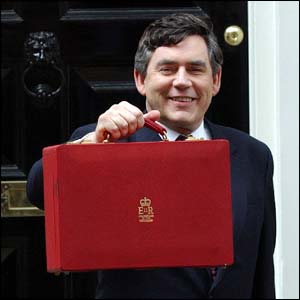Gordon Brown wants the UK to be 'the most attractive
location to do business.' He has a problem. Every other finance minister in the
capitalist world wants the same for their own country.
Gordon has cut corporation tax (the main tax on firms) from
33% to 31% in 1997, to 30% in 1999, to 28% in the last budget. But it's not
working. The OECD (the rich countries' club) reports that its member nations
all cut corporation tax by 9% between 1985 and 2000. Ireland cut the tax from
38% in 1997 to 12.5% in 2003.
The same is true for the higher rate of tax paid by rich
people. In 1979 it stood at 83%. Thatcher and the Tories cut it to 40% and
Gordon has kept it down. Yet this country now has a higher top rate than any
other major country except Australia.
What is happening is a race to the bottom. Tax is levied in
all capitalist countries to produce the things individual capitalists cannot
provide at a profit. Without the infrastructure of roads and communications
capitalist trade would be impossible. Business needs this infrastructure. They
just don't want to pay for it, that's all. And people like Brown argues that
they don't have to.
Capital is footloose and fancy-free. It can dance round the
world in search of the lowest costs – and that includes the cost of tax.
People, by and large, are stuck where they are by a million ties of family,
friendship and practicality. You can't run and you can't hide. So the national
tax authorities can bomb you to bits. And that's what's been going on.
There are two sorts of tax. Direct taxes such as income tax
hit individuals or firms directly. Then there are indirect taxes. They are
mainly taxes on spending, such as Value Added Tax and excise duties. These
taxes can have very different effects on the distribution of income within the
population.
Taxing the rich
Direct tax can be used as a redistributive mechanism. By
taxing the rich heavily, compared with the poor we can work towards a more
equal society. We could also use the money taken from the rich and spend it on
things that benefit the poor. Socialists have always supported a progressive
tax system that bears down heavily on the rich and gives to the poor.
The Communist Manifesto of 1848 called for 'a heavy
progressive or graduated income tax.' Marx knew the rich would resist. He saw
the demand as a first step to their complete expropriation.
But if you refuse to tax the rich, that makes income tax
less progressive. The direct tax system still favours the poor, but not as much
as it did before. Social Trends (an annual of statistical information)
calculates that people on £10-£15,000 pay 10% of their income on tax, while
those on over £100,000 pay 33.6%. But we have to ask why should people on
£10-15,000 a year – poverty wages – be paying tax at all? In 1979 the basic
rate of income tax was 33%. Thatcher cut it to 30%. Brown cut it again to
20%. Social Trends admits that,
"The income tax cuts of the 1970s and late 1980s worked to increase income
inequality."
Gordon Brown would argue that he has introduced a system of
tax credits based on family income to make the income tax system more
progressive. Socialists have always opposed means tested systems in the past.
For a start they swallow up resources in administration. Tax credits cost £400
million to run and take up the time of 7,000 staff. Secondly the intended
recipients have to get their heads round the complicated system and claim. 1.8
million pensioners don't get the credits they're entitled to for this reason.
But more fundamentally tax credits just shift money around
within the income tax system. The big conjuring trick is being performed
off-stage where Brown is letting off big business and the rich and piling the
burden on the working class.
Indirect taxes usually bear down more heavily on the poor.
The reason for this is because they are taxes on spending, and the poor spend
more of the income they get. Indirect taxes are therefore regressive. They make
society more unequal. So guess what Gordon Brown's been doing to keep up tax
revenues, while he's been cutting the rates for the rich? He's been soaking the
poor.
We can all look at our pay slip and see how much we've been
whacked for income tax and National Insurance. It's more difficult to work out
how much tax you're really paying when the tax is just part of the price for
the goods you're buying. That is why the Tories have been rattling on about
Brown's 'stealth taxes.'
Social Trends states that, when it comes to indirect taxes,
the poorest fifth of the population pay 31% while the richest fifth pay 15%. So
all the mild progressive redistribution of the income tax regime is undone by
proliferating taxes on consumption.
The local Council Tax introduced by the Tories after the
Poll Tax fiasco, for instance, is heavily regressive. Charles Elphicke, head of
tax at accountants ReedSmith, reckons, "The impact of rising indirect
taxes mean that the bottom 20% of taxpayers in terms of income have an
effective tax rate of 42%, while the rest have an effective tax rate of 35%."
So, under Labour, the poor pay more!






